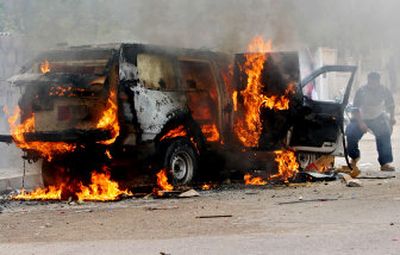Scores killed in Iraq violence

BAGHDAD, Iraq – Four days of sectarian slaughter killed at least 91 people by Monday in Balad, a town near a major U.S. air base an hour’s drive north of the capital. Elsewhere, 60 Iraqis died in attacks and 16 tortured bodies were found.
The U.S. command said seven American troops died in fighting a day earlier. That raised the U.S. toll to 58 killed in the first two weeks of October, a pace that if continued would make the month the worst for coalition forces since 107 U.S. and 10 British soldiers died in January 2005.
Iraqi deaths also are running at a high rate. According to an Associated Press count, 708 Iraqis have been reported killed in war-related violence this month, or just over 44 a day, compared with a daily average of more than 27 since the AP began tracking deaths in April 2005.
A surge in sectarian bloodshed and jump in U.S. casualties coincide with the run-up to the American midterm elections in which the Bush administration’s handling of the Iraq war has become a key issue.
The U.S. military has kept a low profile in Balad, where violence began Friday with the slaying of 17 Shiite Muslim workers. Revenge-seeking Shiite death squads then killed 74 Sunnis, causing people to flee across the Tigris River to the nearby Sunni-dominated city of Duluiyah.
An American spokesman did not directly respond when asked if the Iraqi government had sought U.S. military assistance in quelling the violence.
“Coalition force units are partnering with Iraqi police and Iraqi army units involved in operations around Balad. We are also providing quick reaction assets to the Iraqi police and army. The IA and IP are in the lead with the operations around Balad,” Lt. Col. Christopher Garver said.
President Bush, meanwhile, telephoned Prime Minister Nouri al-Maliki on Monday to reassure him of American support as rumors swirled through Baghdad that Washington had lost patience with the Shiite leader during his little more than four months in office.
Bush spokesman Tony Snow said the president used the 15-minute conversation to tell al-Maliki there was no American deadline for the Iraqi government to be able to stand on its own.
Al-Maliki “said that rumors sometimes can undercut confidence in the government and also its ability to work effectively in fighting terror,” Snow reported. “And the president said, ‘Don’t worry, you still have our full support.’ “
Later Monday, Ali al-Dabagh, al-Maliki’s spokesman, told the AP that the prime minister had asked parliamentary political blocs to nominate representatives to sit on a new committee with a mandate to disband the militias behind the sectarian killings.
The worst attack of the day – 20 dead and 27 wounded – occurred when an explosives-packed car driven by a suicide bomber rammed into a Shiite funeral tent in eastern Baghdad’s Ur neighborhood.
Soon afterward, a car parked nearby exploded, ripping through a crowd of rescuers and onlookers, police Lt. Ahmed Mohammed Ali said.